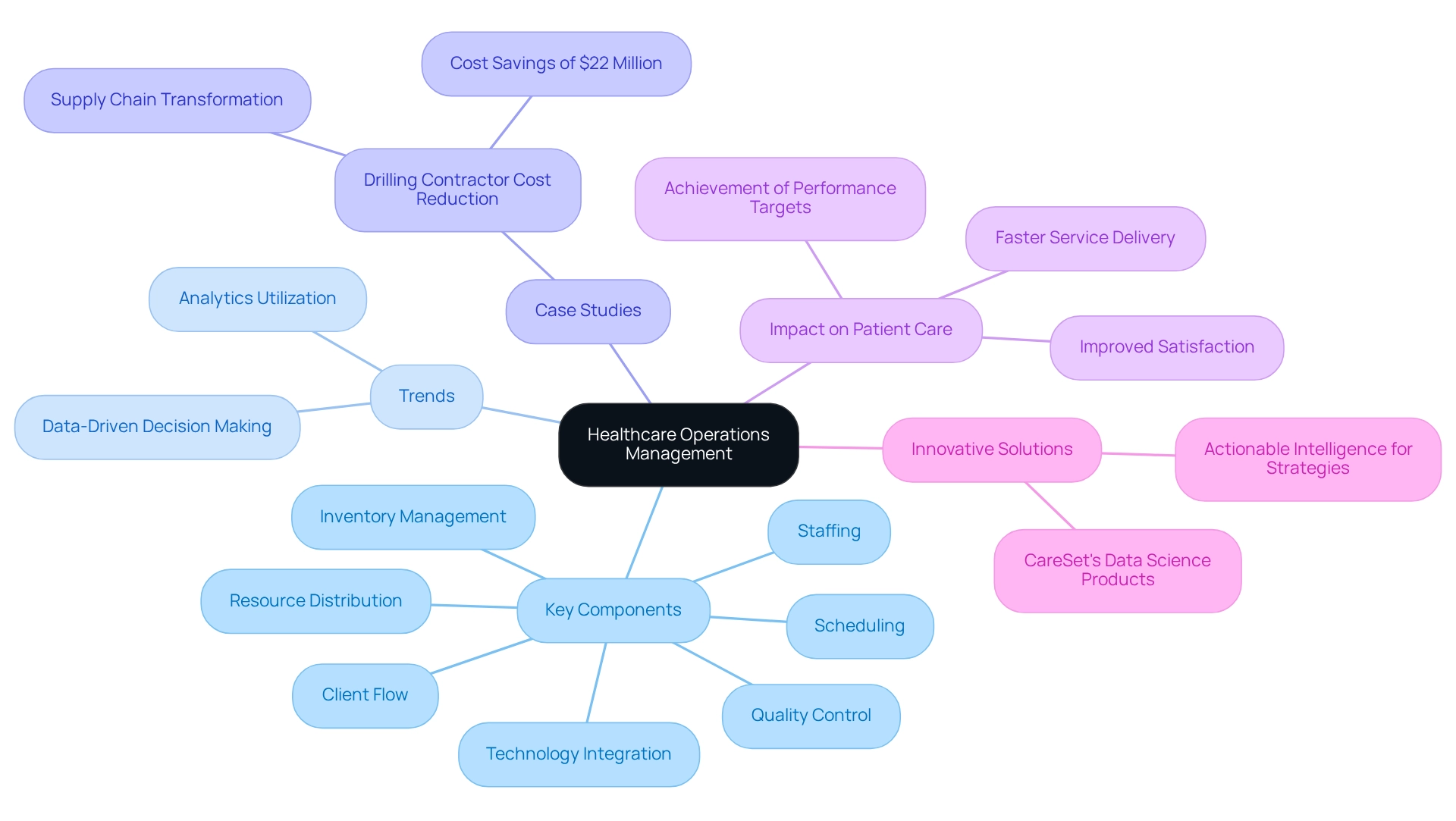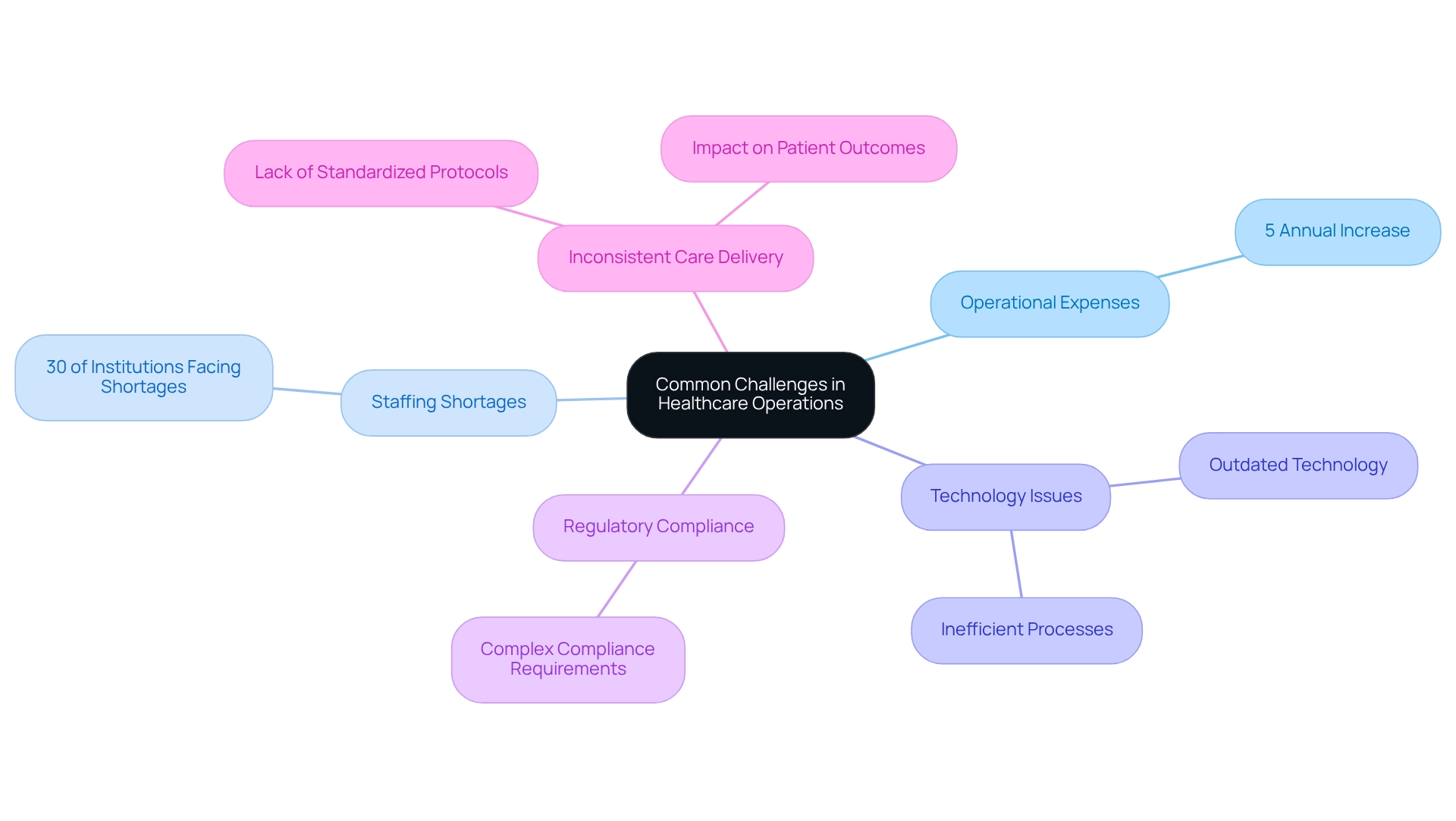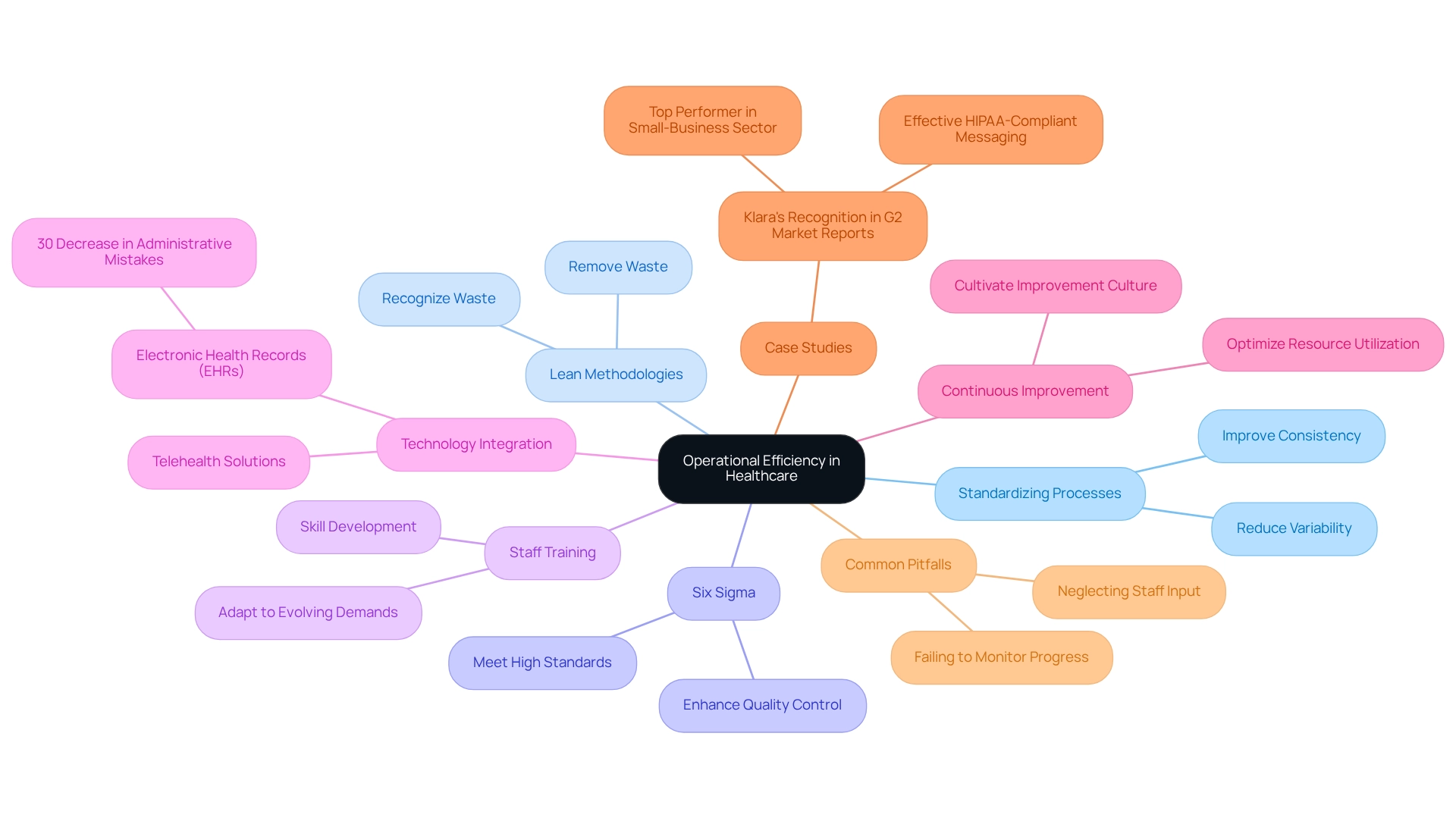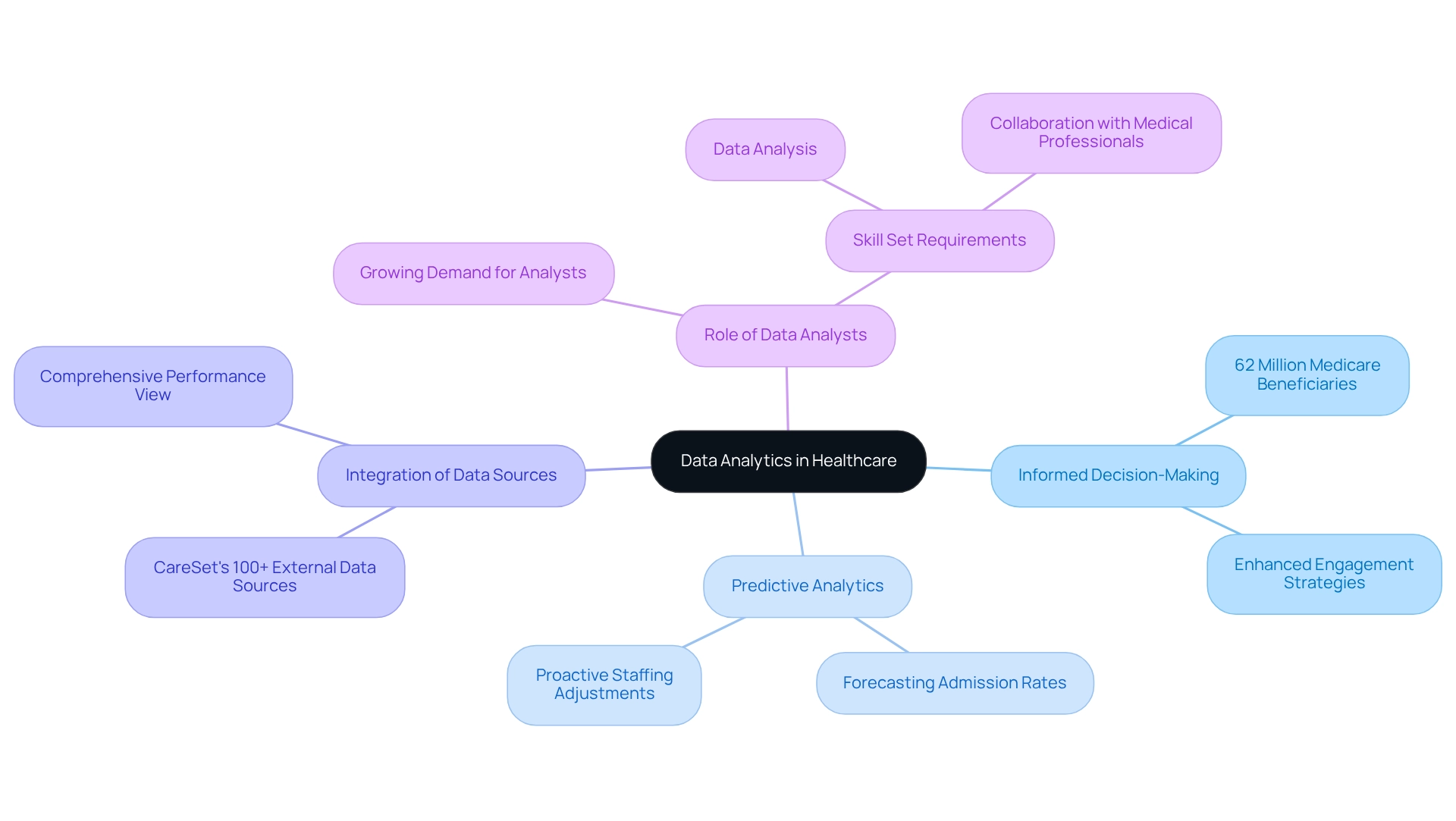Overview
The article centers on strategies to enhance healthcare operations, underscoring the critical role of efficient management practices, data analytics, and best practices in elevating patient care and operational efficiency. It articulates how the implementation of standardized processes, the leveraging of data insights, and the adoption of innovative technologies can markedly reduce costs, enhance service delivery, and boost patient satisfaction within medical institutions.
Introduction
In the intricate landscape of healthcare, operational efficiency transcends mere aspiration; it stands as an essential factor that profoundly impacts patient outcomes and the overall success of organizations. As healthcare facilities grapple with escalating costs, workforce shortages, and stringent regulations, the strategic oversight of operations emerges as a critical priority.
By adopting innovative methodologies and harnessing the power of data analytics, organizations can identify inefficiencies and deploy solutions that elevate service delivery. This article explores the fundamental elements of healthcare operations management, pinpoints prevalent challenges encountered by organizations, and delineates best practices that can foster operational excellence.
Through illuminating case studies and expert insights, it underscores the transformative capacity of data-driven decision-making in redefining the future of healthcare.
Understand Healthcare Operations Management
Healthcare operations management encompasses the strategic planning, organization, and oversight of processes essential for providing medical services. This includes client flow, resource distribution, regulatory adherence, and quality control. Efficient healthcare operations management is vital for ensuring that medical facilities function effectively, directly influencing client satisfaction and resource optimization. Key components include staffing, scheduling, inventory management, and the integration of technology to enhance process efficiency. By comprehending these components, medical institutions can identify inefficiencies in their healthcare operations and implement strategies that enhance overall performance and improve patient care outcomes.
Recent trends in 2025 emphasize a shift towards data-driven decision-making in healthcare operations, with entities increasingly utilizing analytics to refine their processes. CareSet’s extensive Medicare data solutions, which derive insights from over 62 million beneficiaries and 6 million providers, empower medical organizations to make informed choices that enhance efficiency. For instance, a case study involving a drilling contractor revealed that altering supply chain processes resulted in a significant cost reduction of $22 million, underscoring the potential for operational enhancements in medical environments as well. This transformation illustrates how strategic modifications in healthcare operations can yield substantial financial benefits, a principle readily applicable within medical settings.
Statistics indicate that effective healthcare operations can significantly improve satisfaction, with studies demonstrating that streamlined processes result in faster service delivery and enhanced experiences. As Sabu V U., DMS (HMA), MBA, stated, “Decisions made by medical managers not only focus on ensuring that the patient receives the most appropriate, timely, and effective services possible, but also address achievement of desired performance targets.” This highlights the critical role of healthcare operations management in the medical field. By implementing successful strategies and learning from best practices, medical organizations can navigate challenges and foster long-term growth.
CareSet’s innovative data science products, such as [specific product names], further enhance drug launch strategies and medical insights, equipping clients with actionable intelligence for strategic initiatives. Testimonials from clients such as [Client Name] demonstrate how these products have transformed their strategies, emphasizing the significance of data-informed decision-making in enhancing medical operations.

Identify Common Challenges in Healthcare Operations
Healthcare operations face numerous challenges that greatly impede both efficiency and the quality of care provided. Among the primary concerns are rising operational expenses, which have escalated by approximately 5% annually, alongside critical staffing shortages, with nearly 30% of medical institutions reporting substantial gaps in essential positions. These issues, compounded by the complexities of regulatory compliance, create a challenging landscape for healthcare leaders. As noted by Carmine et al., “The pandemic acts as a disruptive event that can increase the salience of paradoxes and complicate organizational responses,” highlighting the urgent need for effective strategies to navigate these complexities.
Additionally, many organizations grapple with outdated technology and inefficient processes within their healthcare operations, leading to delays in patient care. The lack of standardized protocols often results in inconsistencies in care delivery, adversely affecting patient outcomes. A recent study revealed that organizations adopting streamlined procedures experienced a 20% improvement in patient satisfaction ratings. CareSet’s integration of over 100 external data sources, including insights from more than 62 million Medicare beneficiaries and 6 million providers, underscores the importance of comprehensive data analysis in addressing these operational challenges and enhancing provider engagement.
By recognizing these challenges, healthcare operations can strategically prioritize areas for improvement. The case study titled “Putting Patients First: Unlocking Medicare Data to Empower HCP” demonstrates how leveraging Medicare data can facilitate timely and meaningful engagement with healthcare providers, particularly in oncology treatment options such as Qinlock for Gastrointestinal Stromal Tumor (GIST). The implementation of CareSet’s solutions led to a marked increase in engagement metrics, showcasing enhanced efficiency and fostering a culture of flexibility and resilience, which is essential for navigating the evolving healthcare landscape in 2025. Furthermore, acknowledging the interconnectedness of financial management and quality of care is crucial, as these elements significantly influence treatment outcomes in medical settings.

Implement Best Practices for Operational Efficiency
To enhance healthcare operations efficiency, medical organizations must implement several best practices. Standardizing processes in healthcare operations is crucial as it significantly reduces variability and improves consistency in care delivery. Lean methodologies are essential for recognizing and removing waste in healthcare operations, while Six Sigma techniques enhance quality control to ensure that healthcare services meet high standards. Moreover, investing in staff training and development is vital for enhancing healthcare operations by equipping employees with the skills necessary to perform their roles effectively and adapt to evolving healthcare demands.
The incorporation of technology, including electronic health records (EHRs) and telehealth solutions, can streamline healthcare operations and enhance user engagement. For instance, a hospital that implemented EHRs experienced a remarkable 30% decrease in administrative mistakes, directly contributing to improved safety and satisfaction for individuals receiving care. Furthermore, organizations that embrace these best practices not only boost healthcare operations efficiency but also cultivate a culture of continuous improvement, ultimately leading to better patient outcomes and optimized resource utilization in their healthcare operations.
As Simon Lorenz, Co-Founder of CareSet, noted, “Coming from a family of doctors, I was meant to become a physician too but became fascinated instead by the business and services aspect of the medical field.” This perspective underscores the importance of adaptability in medical practices. Additionally, CareSet integrates over 100 external data sources for comprehensive insights, highlighting the critical role of data-driven decision-making in enhancing efficiency.
A notable illustration of successful implementation of best practices is Klara’s recognition in the Spring 2024 G2 Market Reports, where its software solution was acknowledged for its performance and ROI in the small-business sector. This case study exemplifies how effective healthcare operations can lead to significant improvements in medical service delivery.
However, entities must remain vigilant against common pitfalls when implementing these best practices, such as neglecting staff input or failing to monitor progress, which can undermine the effectiveness of their strategies. By addressing these challenges, medical institutions can bolster their healthcare operations to ensure success in a constantly evolving environment.

Leverage Data Analytics for Informed Decision-Making
Data analytics stands as a cornerstone in healthcare operations, empowering organizations to make informed, data-driven decisions. By examining data from individuals, including insights from over 62 million Medicare beneficiaries and 6 million providers, healthcare professionals can uncover trends in treatment outcomes, optimize resource allocation, and enhance engagement strategies. For instance, predictive analytics can accurately forecast admission rates, enabling hospitals to adjust staffing levels proactively, which is vital for maintaining operational efficiency.
Moreover, the integration of diverse data sources, such as Medicare claims and client feedback, offers a comprehensive view of performance. CareSet exemplifies this by incorporating over 100 external data sources for its analysis, thereby enriching insights derived from functional data and providing a thorough understanding of treatment pathways for individuals. Organizations that harness the power of data analytics not only enhance their healthcare operations but also significantly elevate the standard of care delivered to individuals.
As the demand for skilled data analysts in the medical sector continues to rise, with projections indicating substantial growth in this field, the capacity to leverage data effectively will emerge as a key differentiator in the medical landscape of 2025 and beyond. Industry insights reveal that the increasing reliance on data-driven decision-making in healthcare underscores the critical role of skilled analysts in achieving improved patient outcomes.

Conclusion
In the realm of healthcare, operational efficiency is not merely a goal—it is an essential element that directly influences patient care and organizational success. The exploration of healthcare operations management uncovers the critical components that underpin effective service delivery, including:
- Strategic planning
- Resource allocation
- The integration of technological advancements
By addressing prevalent challenges such as rising costs and staffing shortages, healthcare organizations can implement best practices that streamline processes and enhance patient satisfaction.
The role of data analytics emerges as a transformative force in this landscape, empowering organizations to make informed decisions that drive operational improvements. Insights drawn from extensive data sources, such as Medicare claims and patient feedback, enable healthcare providers to refine their strategies, optimize resource allocation, and predict patient needs. As evidenced through various case studies, the application of data-driven methodologies not only fosters operational excellence but also yields significant financial benefits and improved patient outcomes.
Ultimately, the journey toward operational efficiency in healthcare is continuous and necessitates a commitment to embracing innovative practices and comprehensive data analysis. By cultivating a culture of adaptability and resilience, healthcare organizations can adeptly navigate the complexities of the industry, ensuring they meet the evolving demands of patient care while achieving their performance goals. As the healthcare landscape continues to evolve, prioritizing operational efficiency will remain a cornerstone for success, paving the way for a healthier future for all stakeholders involved.


